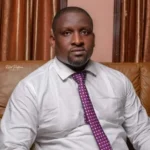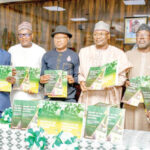The Independent National Electoral Commission (INEC) on Tuesday said it was reviewing its adopted technologies for elections, with the view of introducing new ones to improve conduct of the elections ahead of 2023.
The INEC Director of Voter Education and Publicity Department (VEP), Mr Nick Dazang, disclosed this at a workshop for the department on the “Review of National Voter Education Manual” held in Keffi, Nasarawa State.
- “Cross River North By Election: INEC wrong to issue certificate of return to Jarigbe”
- Ugandans banned from social media ahead of presidential election
The five-day workshop is organised by INEC in partnership with the Westminster Foundation for Democracy (WFD).
Dazang, speaking with newsmen on the sideline of the workshop, said INEC began the process for electronic voting since 2004 when it introduced optic map registration forms.
“After that in 2010, the commission introduced the use of direct data capture machines, and then expanded the use of the machines in the conduct of the 2011 election.
“So, we have started the process as far back as 2004, culminating in the use of the Smart Card Reader (SCR) and the Permanent Voter Cards (PVCs) that we also used in 2015.
“But the commission is reviewing this process with a view to upgrading and improving the conduct of elections in 2023.
“The commission wants to introduce new technologies that will help deepen the conduct of the elections, and also improve on them. So the commission is working assiduously on that.
“Very soon, when the Commission has taken a position, it will come out and explain to Nigerians how this is going to be done,” Dazang said.
He said that in introducing the new technologies, INEC would revisit the use of card readers and likely to introduce other technologies that will work seamlessly with electronic voting in 2023.
“The commission has been working on that in the past few months and God’s willing in the next few months the commission will make its position known to the public.”
He said that INEC would continue to introduce new technologies to the electoral system, not for the fancy of it, but the technologies that worked.
He noted that the commission had no regrets on the technologies it had so far introduced for the conduct of elections in Nigeria as they had helped in deepening the process and the transparency.
Dazang said that the commission was also reviewing its voter education to enable it to explain better the planned technologies to Nigerians.
Commission to review voter education
“In reviewing our voter education, we are looking at certain dynamics including the technologies that the commission intend to introduce.
“We have to be on top of the matters so that we can explain the application of these technologies to Nigerians as we did when we introduced SCR, direct data capturing machines and PVCs.
He described voter education as key part of the electoral process that needed concerted efforts not just from INEC, but all stakeholders.
“If you look at what is happening around the globe including Nigeria, so many changes are happening that necessitate the urgency to review voter education.”
This, according to him, include the issue of changes in technology and COVID-19, saying we need to change our communications process to respond to the changes.
“We need to change our communications in response to growing youth population. We need to use strategies that resonate with the youth and women population.”
Amendment of Electoral act
On the amendment of the Electoral Act, Dazang said that the commission was working seriously with two committees of the National Assembly, adding that substantial gains were being made on the amendment.
He expressed optimism that the NASS would rise to the challenge in meeting up with its promise to Nigeria to amend the Electoral Act before the end of the first quarter of 2021.
On the Anambra governorship election, Dazang said that the commission would at the appropriate time issue the date and timetable for the conduct of the election, latest by six months to the conduct.
He urged the staff members of the commission to always upgrade themselves on new technologies as well as continue to obey the COVID-19 safety protocols.
Speaking earlier, the WFD Country Representative in Nigeria, Mr Adebowale Olorunmola, assured of the foundation’s continuous support for INEC to deepen voter education in Nigeria, especially at the grassroots.
According to him, the foundation started its partnership with INEC in 2015, ensuring more inclusion of women and people living with disability in electoral process.
Olorunmola commended INEC for deepening voter education and expanding the inclusive electoral process for women and people living with disabilities and also ensuring that the electorate exercise their rights in more informed manner.
“There is nothing like advanced democracy anymore but work in progress. If you look at what has been happening in USA even with their decades of practising democracy they are still moving to deepen voter education,” he added.

 Join Daily Trust WhatsApp Community For Quick Access To News and Happenings Around You.
Join Daily Trust WhatsApp Community For Quick Access To News and Happenings Around You.


